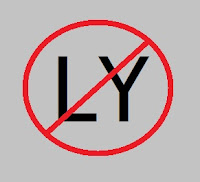A few quick cuts. A little off the top.
Once again, I must make pathetic excuses for missing last week. I wanted to post this Wednesday night before I left for
Crypticon Seattle, but ended up bogged down in last minute preparations. By the time I realized I never put this up, I was about two miles above San Francisco.
Anyway, enough of my pathetic excuses. Let’s talk about cuts.
As writers, we all need to make cuts.
Our first drafts always have too much. We put in every wild idea and detail and prolonged conversation.
Before anyone says anything—no. None of us write perfect first drafts. Not one person reading this. Not you. Not me. Definitely not that guy over there. The only person who writes usable first drafts is
Paul Haggis, and even he doesn’t think they’re perfect (Clint Eastwood does, though). And Paul isn’t here, so we’re back to saying none of us.
(Mr. Haggis—if you are here, thanks so much for the support. You probably don’t remember, but I interviewed you twice for Creative Screenwriting and you were fantastic)
All this means that in the second draft, third at the latest,
we have to make cuts. We want our books and screenplays and short stories to be lean and tight. It’s a tough world out there, with a lot of tough publishers, and I can’t expect my story to get anywhere if it’s not at fighting weight.
So, here’s a few quick, painless ways you can make some cuts and help your manuscript lose a thousand words or so…
Adverbs— As I said above, most of us get caught up in the flow of words, the impetus of a scene, and the thing that slides by most often is the all-but-useless adverb. We try to pretend they’re important, but they can always be replaced. When it comes down to it, adverbs are the Shemps of the writing world.
Three out of five times if you’re using an adverb, you just don’t need it. The fourth time odds are you’re using the wrong verb, and once you find the right one, again, you won’t need the adverb. And that fifth time… well, maybe it’s only one in six. If you’re using your vocabulary well, there aren’t many times you need an adverb.
I was at a conference a few years back where writer/ Editor Pat LaBrutto tossed put a great rule of thumb. One adverb per page, four adjectives per page. It’s only a guideline, granted, but if you’re averaging five or six adverbs per paragraph… maybe you should give them all a second look.
In my recent editorial pass of the fourth Ex book, I cut just over 200 adverbs from the manuscript. That’s almost a full page of adverbs, gone. Search your manuscript for LY and see how many you find.
Adjectives—People use a lot of adjectives to make normal, average things sound interesting. Coincidentally, these folks tend to have a poor vocabulary. So when I don’t know multiple words for shirt (like Henley, tunic, tee, blouse, polo, Oxford), I’ll just use multiple adjectives.
Of course, we all go a little overboard now and then (anyone who says they don’t is lying to you) because we’re convinced this person, this place, this thing needs extra description. Yet we all know too much description brings things too a grinding halt.
There’s an odd habit I’ve seen among fantasy writers—not only them, but enough to make it worth mentioning—to use dozens of adjectives per page, if not per sentence–often redundant ones like “gleaming chrome blade of pure silver.” I’ve mentioned before that I used to help run an online fantasy game a few years back, and the other night I was talking with one of the staff members who’s still there. And she and I hit on a wonderful turn of phrase that I think applies here. Simply put, using
more adjectives and adverbs doesn’t make me a better writer. It just means I’ve got a weak vocabulary and I’m a very poor editor.
That—People tend to drop
that into their writing a lot, and a good four out of five times their writing would be tighter without it. I used to be a
that junkie until someone pointed out how unnecessary it often is.
She punched him in the same spot that he had been stabbed in.
He knew that the machine would not stop—ever—until she was dead.
Phoebe could see that the two of them were meant to be together.
On that same Ex book, I cut over 130 that‘s—just over half a page. Use the Find feature, search for uses of that in your writing, and see how many of them are necessary. Odds are you’ll find that at least half of them aren’t.
Useless Modifiers— I’ve also called this Somewhat Syndrome a few times. This is another one I wrestle with a lot, although I like to tell myself I’ve gotten better about it. It’s when I pepper my writing with somewhat.., sort of…, a bit…, kind of…, and other such modifiers. Nine times out of ten they’re not doing anything except adding to my word count (not in the good way) and slowing my story (also not in the good way). Use the Find feature again and see how many of these are doing anything in your writing, and look how much tighter and stronger your story is without them. I cut another 200 hundred of these in the aforementioned Ex book manuscript.
Appeared to be… –This is one of those phrases some folks latch onto and use all the time. Problem is, most of them don’t understand it. It tends to be used as an introduction of sorts, leading the reader into some purple-prose description. This phrase sometimes disguises itself as seemed to be or looked like or some variation thereof.
The thing is, appeared to be doesn’t get used alone. It’s part of a literary construction where the second half of that structure is either an implied or actual contradiction. So when I’m saying…
The creature seemed to be looming over us.
…what I’m really saying is something along the lines of…
The creature seemed to be looming over us, but it was just the shadows making it look bigger than it really was.
…and what I wanted to say all along was just…
The creature loomed over us.
If I’m not trying to establish a contradiction, using appeared to be and its bastard stepchildren isn’t just wasted words– it’s wrong.
Just by saying “as you know,” I’m stating that the character I’m speaking to already knows the facts I’m about to share. So why repeat them? Why would I have two people engage in such a useless bit of dialogue?
When I put in “as you know” or one of its half-breed cousins, it’s a poor attempt to put some exposition in my story with dialogue. If I’m using it, I guarantee you there’s either (A) a better way to get the information to the reader or (B) no need for it because it’s already covered somewhere else.
I might be able to get away with doing this once–just once–if I’ve got a solid manuscript. I mean rock-solid. And even then, it shouldn’t be in my opening pages.
Anyway, there’s half a dozen quick, easy cuts. Try them out and see if you can drop a few hundred words or more.
Next time, I want to get back on schedule by quickly pointing out a possible problem.
Until then, go write.
 It’s tempting to have everyone get everything right in a story. They understand every reference, know the complete history of every nation on Earth, comprehend every bit of jargon or slang. The truth is though, people get stuff wrong all the time. There are people whose only knowledge of firearms comes from Schwarzenegger movies,and there are folks who got most of their medical knowledge from House. For the longest time, most of my investigative skills came from the Three Investigators and the Hardy Boys, with some fine tuning from Scooby Doo. This is just human nature.
It’s tempting to have everyone get everything right in a story. They understand every reference, know the complete history of every nation on Earth, comprehend every bit of jargon or slang. The truth is though, people get stuff wrong all the time. There are people whose only knowledge of firearms comes from Schwarzenegger movies,and there are folks who got most of their medical knowledge from House. For the longest time, most of my investigative skills came from the Three Investigators and the Hardy Boys, with some fine tuning from Scooby Doo. This is just human nature. It’s tempting to have everyone get everything right in a story. They understand every reference, know the complete history of every nation on Earth, comprehend every bit of jargon or slang. The truth is though, people get stuff wrong all the time. There are people whose only knowledge of firearms comes from Schwarzenegger movies,and there are folks who got most of their medical knowledge from House. For the longest time, most of my investigative skills came from the Three Investigators and the Hardy Boys, with some fine tuning from Scooby Doo. This is just human nature.
It’s tempting to have everyone get everything right in a story. They understand every reference, know the complete history of every nation on Earth, comprehend every bit of jargon or slang. The truth is though, people get stuff wrong all the time. There are people whose only knowledge of firearms comes from Schwarzenegger movies,and there are folks who got most of their medical knowledge from House. For the longest time, most of my investigative skills came from the Three Investigators and the Hardy Boys, with some fine tuning from Scooby Doo. This is just human nature.





